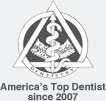What Is Treatment for Occlusal Disease?

Occlusal disease is a very common disorder that affects how the patient bites down when chewing or speaking. A patient’s bite can have an impact not only on the patient’s dental health but also their overall well-being because bite-related problems can lead to chronic concerns like migraine headaches or teeth that have been worn down to the dentin. The most important thing that patients need to know about this disease is that it’s vital that it’s diagnosed early. Occlusal disease is a problem that can be cured with early detection and proper treatment. If you notice any of the symptoms of an improper bite outlined below, tell your dentist right away!
What is Occlusal Disease?
When a person’s bite is not properly aligned a destructive process occurs in the mouth and this is known as occlusal disease. Every time the teeth come together to chew or when the patient is speaking, there are forces that have a negative impact on the teeth and the jaw. Proper alignment of the teeth is important because it affects not only the health of the teeth themselves but the jawbone and the jaw muscles also. Problems that develop from having occlusal disease are extremely common. Occlusal disease is the most undiagnosed dental disorder that patients and dentists often fail to recognize. The disorder includes issues related to the teeth, jaw joint, and the muscles of the jaw or problems associated with all three.
At Pacific Northwest Prosthodontics, we try to educate patients about occlusal disease to prevent the development of needless pain and difficulty caused by an improper bite. By learning a bit about how your bite can impact not just your dental health but your overall well-being, you can avoid some of the pitfalls of having occlusal disease and correct the problems before they become major issues.
Occlusal Disease Symptoms
We educate our patients at Pacific Northwest Prosthodontics about the symptoms of occlusal disease so they can take action to correct an improper bite as soon as possible. The symptoms associated with this disease are easy to identify:
- Certain surfaces of the teeth may have excessive wear and tear. The enamel may get worn through to the dentin in areas where there is constant friction. Dentin is the layer of the tooth that is just underneath the enamel. Once dentin is exposed it may wear away faster than the enamel. In some patients, the front teeth may look smaller in appearance due to wear. In other patients, the back teeth may wear away and become flat.
- Loose teeth are a sign of occlusal disease. At Pacific Northwest Prosthodontics, when we see a patient who has teeth that have become loose and are moving, we immediately look for other signs of occlusal disease.
- Teeth become sensitive to hot and cold.
- Teeth may become sore after biting into food.
- Teeth may become fractured easily.
- Headaches are a common symptom of occlusal disease because the muscles that work the jaws may become sore and painful due to the misalignment of the bite.
- The jaw joint may become inflamed or painful. Popping or clicking in the jawbone during speaking or eating is a common symptom of occlusal disease. In some patients, there is no pain even though there’s popping.
Occlusal Disease Treatment
Early diagnosis and treatment of occlusal disease is the best way to prevent damage to the teeth. When an improper bite is properly diagnosed before the disease has a chance to progress, treatment is relatively easy and less expensive solutions are possible.
At Pacific Northwest Prosthodontics, we may do a mild reshaping of the teeth to restabilize the patient’s bite when occlusal disease is present. Restoration of the teeth that have been worn down may be necessary and orthodontic treatment to align the teeth and the jaw can be performed to not only correct the damage but to restore proper alignment. In some cases, a combination of teeth reshaping, restorations, and orthodontic work are necessary, but the most important key to preventing occlusal disease progression is to seek out a diagnosis and treatment early.
Before diagnosing occlusal disease at Pacific Northwest Prosthodontics, we do a thorough exam to rule out other possible problems. Typically, doing an exam for occlusal disease is not part of a conventional dental exam so patients may continue to suffer in silence if they don’t bring the problem of worn teeth or pain and popping in the jaw to the attention of the dentist. Patients who have noticed these issues should be sure to mention them to the dentist in order to avoid causing more damage to the teeth and the jaw over time.
Our goal with occlusal disease treatment is to develop a plan that will lead to a comfortable and stable bite where the teeth, jaws, and muscles work together harmoniously. If left untreated occlusal disease will slowly worsen over time. The teeth will wear down faster than they should, and the patient may even lose their teeth early. Problems with the jaw muscles are inevitable and can continue to cause unnecessary discomfort. And with each passing year, the complexity and cost of treatment will increase.
Occlusal Disease Treatment Results
Patients who have had occlusal disease diagnosed early can expect to be prescribed some fairly straightforward treatment options. People who have had the occlusal disease for a longer period of time will most likely require orthodontic care to correct the problem which takes longer and costs more than the treatment of occlusal disease that has been diagnosed early.
Treatment results are often excellent. The dentist may alter the teeth just slightly to create a more comfortable bite. Or custom restorations could be designed to add volume to teeth where it’s needed. Only the most severe cases of the occlusal disease require orthodontic treatment! And since this is a disease that worsens over time, it’s essential that the patient notes that a problem exists and tells the dentist immediately so treatment can begin before the teeth become excessively worn down or even lost. Without intervention, occlusal disease will inevitably lead to bigger dental problems down the road which is why we always try to make this diagnosis early.

 (425) 549-4649
(425) 549-4649









